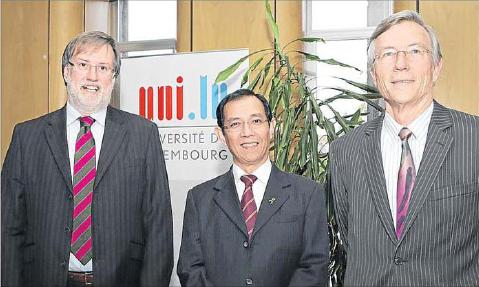Extraordinary Lesson in History
Professor Tan Sri Dato' Dzulkifli Abd Razak
Article
Luxemburger Wort - 10/29/2010
Actually, the “Rentrée Académiques” are always extraordinary. The guest speakers are interesting and they come from various milieus (social environments), but with Professor Abdul Razak Dzulkifli from Malaysia there was a speaker standing at the rostrum, who also spread an uncomfortable truth.
In the beginning, Vice- Chancellor Rolf Tarrach went into the higher earnings of academics. He mentioned that, in the lifelong earnings, an academic degree makes 230,000 Euros, and he added that one-third of it would go to the state in the form of taxes. Next, he repeated the well-known numbers of matriculations which earns the young university of Luxembourg an additional increase of 5,000 students. Finally, he expressed his thanks towards the ten most important private sponsors of the university, who support it partly since years.
Article
Luxemburger Wort - 10/29/2010
Actually, the “Rentrée Académiques” are always extraordinary. The guest speakers are interesting and they come from various milieus (social environments), but with Professor Abdul Razak Dzulkifli from Malaysia there was a speaker standing at the rostrum, who also spread an uncomfortable truth.
In the beginning, Vice- Chancellor Rolf Tarrach went into the higher earnings of academics. He mentioned that, in the lifelong earnings, an academic degree makes 230,000 Euros, and he added that one-third of it would go to the state in the form of taxes. Next, he repeated the well-known numbers of matriculations which earns the young university of Luxembourg an additional increase of 5,000 students. Finally, he expressed his thanks towards the ten most important private sponsors of the university, who support it partly since years.

It is the Bank Sal Oppenheim, Joël Berend-Biever, the Chamber of Commerce of Luxembourg, the Luxembourgian Cancer Foundation (FLCC), TDK Europe, the city of Luxembourg, ATOZ tax advisers, SES, ArcelorMittal and the Deutsche Bank Luxemburg. As recognition of the sponsorship, one of the sponsors symbolically handed over the “Bourse Berend-Biever” of 4,000 Euro to Katarina Birosova. The student is currently doing her matriculations in her third semester of “Master en Droit Européen LLM – Filière Contentieux européen”. She is 23 years old and comes from Slovakia. Then, the Vice- Chancellor expressed his thanks to the Academic Deputy Vice-Chancellor Lucien Kerger, who will leave his post on April 1, 2011. Kerger’s work was honoured by Rolf Tarrach’s words and a long applause.
The evening on Campus Kirchberg was accompanied by the “Ensemble Vocal” of the University of Luxembourg under the guidance of Julia Pruy. They sang variations of Schubert’s ‘Forelle’, a gospel song and the student song ‘Gaudeamus Igitur’. Not every academician who sang was deeply moved, but it was clear that this song had left its mark on several student generations. Many proved this by singing along, others by time-lost smile.
Highlight of the academic rentrée was the guest address of Professor Abdul Razak Dzulkifli, Vice- Chancellor of Universiti Sains Malaysia. His speech was regarding on the loss of history, which he explained in the so-called dark, medieval ages. This, in fact, has been for Europe an era of intensive learning. During this period one took advantage of the strong Arabic presence (Emirate Sicily, Kalifat Cordoba). Although Europe has taken an unpredicted up-turn after the reconquista of the Iberian Peninsula, one could not speak of a dark era. Dzulkifli – from an Easterner’s point of view - called for an unprejudiced handling of history, which would honour the achievements of the East and the West as well. He sees a chance in the cyclical up and down nature of western and eastern dominance, when both parts of the world could learn from each other and could respect their achievements (see below).
As the representative of the Minister for Higher Education and Research Franςois Biltgen was prevented from attending due to health reasons, senior civil servant Germain Dondelinger delivered two political messages. He ensured the promise of the government to stick to the university plans and to the location of Belval in the proposed time frame. Nevertheless, he emphasized once again that the reform of the government aid for students will be carried out. The government is convinced by the European conformance of the act, though it was strongly criticized by the unions.
As an extraordinary illustration of his thesis, Dzulkifli infers to the period of the medieval age
(9th - 15th century)in Europe. In the occidental world, this area is generally referred to as the “black medieval age”. In fact, during those centuries Europe has been exposed to the influence of an undeniably more advanced civilization – at the same time with the Arabic sovereignty over the Iberian Peninsula and to Sicily. This has been a time of intensive learning. It served as a basis for Europe’s world supremacy later on. The intensive learning also served as a basis for Europe’s Euro- centered view of the world.
The scholar’s worries: In the past, the non-recognition of the eastern legacy has caused tremendous tensions. Nowadays, while China is about to switch again the worldwide power center, one has to learn from history. Only on the basis of having mutual respect of the mental achievements of each other, could the cooperation on earth be possible.
* The writer is the Vice-Chancellor of Universiti Sains Malaysia. He can be contacted at vc@usm.my
